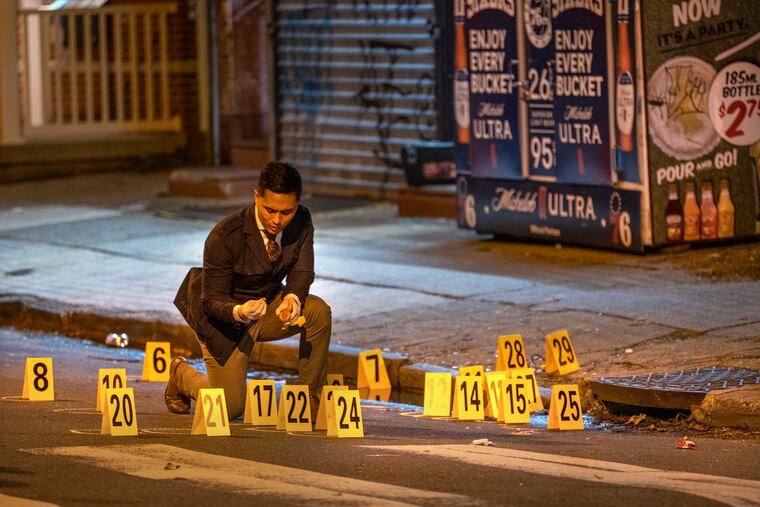In their plans to reduce crime, a window into the mayoral candidates’ views on public safety | Editorial
The top agenda item for Philadelphia's next mayor? Stemming the tide of murders, shootings, robberies, and carjackings that have created a sense of lawlessness across the city.

The number of murders increased every year Jim Kenney was mayor, before an 8% drop in 2022. Even with the decrease, the 516 homicides last year were nearly double the number the year before Kenney took office.
Yes, murders have increased across the country, but Philadelphia has more killings than New York City, which has nearly seven million more residents. It’s not just murders that have many Philadelphians on edge. A steady rise in shootings, robberies, and carjackings has added to the sense of lawlessness across the city.
So, job one for the next mayor is tackling crime.
With nine viable candidates running in the Democratic primary — and the winner likely to be elected mayor in November given Democratic voters outnumber Republicans 7-1 in the city — one of the top challenges facing voters is to determine who has the right plan to reduce murders and crime.
Before casting a vote, it is important to go through each candidate’s proposals and listen to what they have to say.
The search for an answer begins with the current leadership. Will the next mayor retain Police Commissioner Danielle Outlaw, who took the reins of the department in February 2020?
During a candidate forum in January, former City Councilmember Derek Green was the only viable candidate to say he would not keep Outlaw. Warren Bloom Sr., who has run for elected office six times, also said no.
At the time, former Councilmember Helen Gym said she would keep Outlaw, but changed her position at a forum on Wednesday. After initially sidestepping the issue in January, former Councilmembers Cherelle L. Parker and Maria Quiñones-Sánchez now say they would appoint a new police commissioner.
Former Councilmember Allan Domb and retired Judge James M. DeLeon said they would keep Outlaw. Jeff Brown, the grocery store magnate who has never held elected office, said he couldn’t guarantee whether he would keep Outlaw or not. Former City Controller Rebecca Rhynhart declined to answer.
The next mayor should take the opportunity to meet with the commissioner and determine whether she is the right person for the job. If Outlaw stays, the public deserves to hear what her plan is to root out inefficiency and corruption in the department, instill trust in neighborhoods, and fight crime. The relative silence does not instill public confidence.
Another fraught topic is stop-and-frisk, which allows officers to stop someone if they have a reasonable suspicion they committed or were about to commit a crime. Former Mayor Michael Nutter supported the tactic, and crime dropped during his tenure.
But the American Civil Liberties Union sued the city in 2010, alleging Black and brown people were stopped at a much higher rate than white residents. A consent decree was reached and the number of stops plummeted.
Nearly all the candidates oppose ramping up stop-and-frisk. Only Parker has embraced it.
Also off the table for all the candidates is any plan to defund the police, a battle cry that grew out of the racial justice protests following the abhorrent murder of George Floyd in 2020 by a Minneapolis police officer.
In 2020, Gym tweeted that a plan to dismantle the Minneapolis force showed “how transformative change can happen.” Gym, the most progressive candidate in the field, now says it is “time to stabilize police funding.” It would appear Gym was for defunding police before she was against it, just as she was for Outlaw before she was against her.
Several candidates have talked about the connection between poverty and crime. Others — including Parker, Quiñones-Sánchez, and Rhynhart — have talked up cleaning and greening neighborhoods as part of a way to improve public safety.
Nearly all the candidates have said they would declare a crime emergency — something that Kenney has refused to do. Whether such a declaration would result in change depends on how it is carried out.
Domb also plans to declare a public health emergency in Kensington with a focus on substance abuse treatment and a crackdown on rampant open-air drug dealing. Domb, Green, and Rhynhart have some of the more detailed crime plans on their respective campaign websites. Other plans, such as DeLeon’s, are lacking in substance.
State Rep. Amen Brown called on the governor to declare a state emergency and deploy the Pennsylvania National Guard to Philadelphia. That sounds like something from the Frank Rizzo era, which no one should seek to revive.
There is obviously no simple solution to reducing crime, but there clearly needs to be a greater sense of urgency, focus, and effort beyond the lackluster response by the Kenney administration. Flailing efforts to “do something,” regardless of its efficacy, are misguided. For example, the proposal to hire a public safety director will likely only add to the bureaucracy.
The impact of violence and crime runs through our neighborhoods, our schools, our businesses, and beyond. The next mayor must be able to lead, inspire, hire a quality team, work with diverse stakeholders, implement reforms, and get results.
Philadelphia cannot thrive until Philadelphians feel safe.
We want to hear from you: Send us your letters detailing what you would like to see from the next mayor. Letters may be sent to letters@inquirer.com and should include your name, address, and phone number where you can be reached.